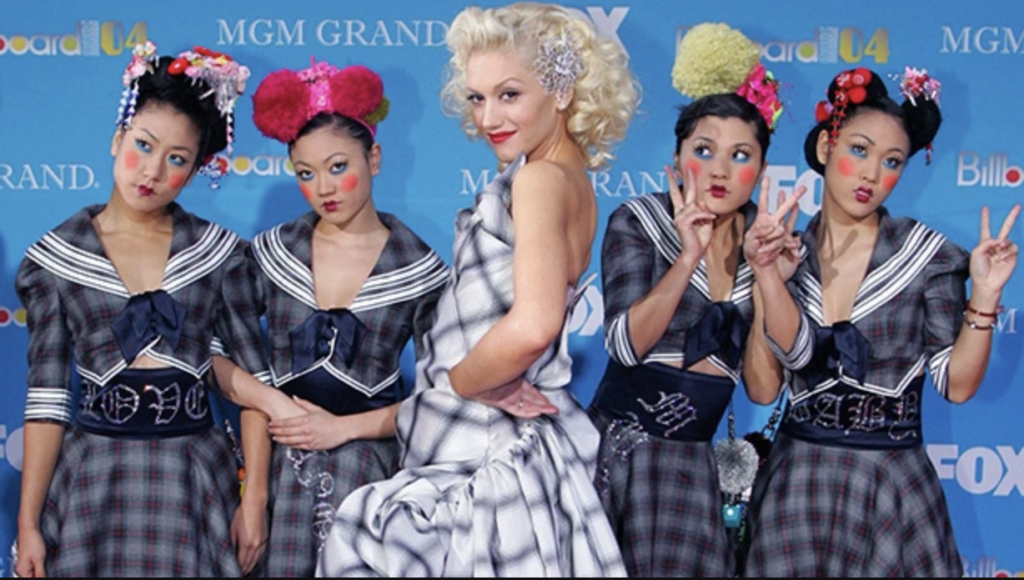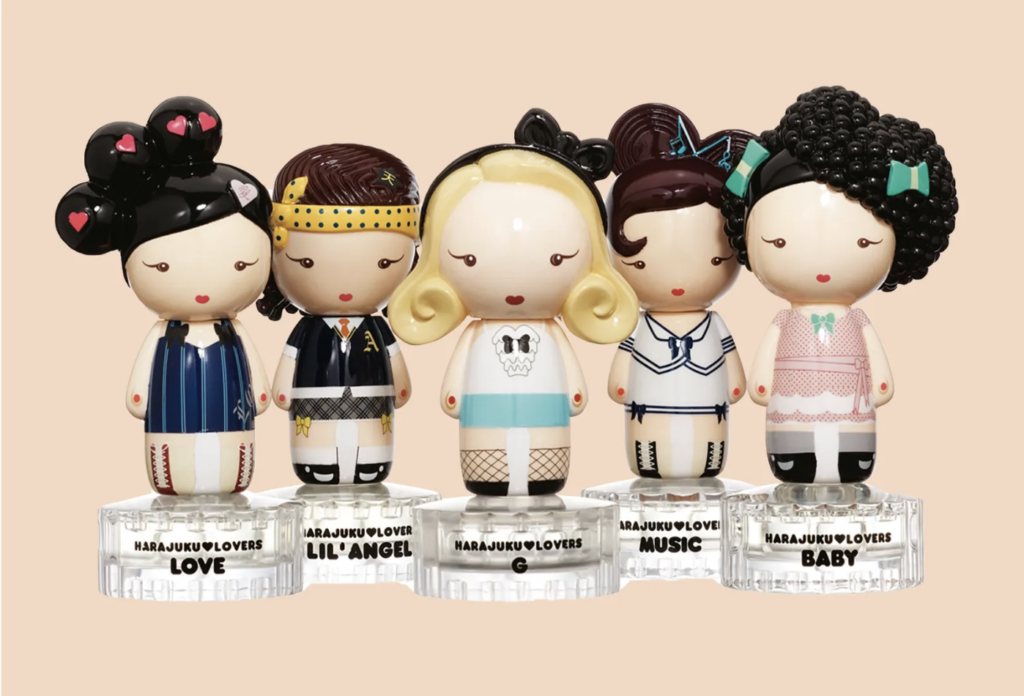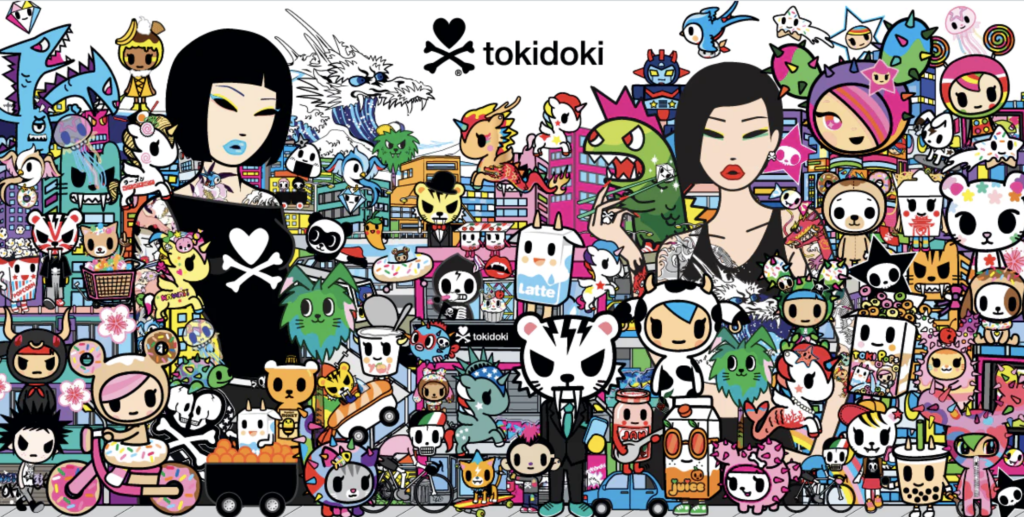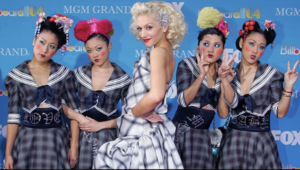Gwen Stefani is getting roasted for remarks she made in a recent Allure article. In discussing her new beauty brand GXVE, interviewer Jesa Marie asked about her Harajuku Lovers fragrance collection, which launched 14 years ago, and its Japanese influence. Gwen Stefani explained that her strong love of Japanese pop culture originates back to when she was a kid. Her father took business trips from California to Japan. For years, he would tell Gwen stories about his experiences in the country and that fascinated her. When she finally visited Japan as an adult, she thought to herself, “My God, I’m Japanese and I didn’t know it” and later said, “I am, you know.” These quotes are going viral with lots of negative remarks.
Here’s the thing. I think the second quote mentioned here was Gwen being cheeky. And I don’t think she literally believes she is Japanese. I wasn’t there and there is only the written article, no video or audio. It’s hard to know for sure the full context and emotion.
But Gwen has never been an Oli London, a White British man who claims to be a “transracial” Korean. She never faked her background like Hilaria Baldwin. She isn’t a Rachel Dolezal. She does have a history of dressing strongly of other cultures, such as Hindu, Jamaican, and Latina. In my opinion, she has sometimes looked silly doing so. But she doesn’t have a history of literally claiming to be anything she isn’t.
I think she simply meant she’s Japanese in the sense that when she visited, she felt a strong affinity with the Japanese people and culture. And that’s fine! That’s the beauty of the world being as connected as ever. We have the internet, we can fly overseas within hours. And we can learn and share so much with one another. I don’t see the issue with that.
But I have a confession. When Gwen’s first solo album came out in 2004, I had a very different opinion. I think I even rage blogged about it at the time. I was much younger and less logical, more easily offended. I doubt I knew of the term “cultural appropriation,” but if I had, I almost certainly would have accused her of that.
She had a song called “Harajuku Girls,” which basically fangirled over Harajuku fashion. In the song “What You Waiting For,” there are the following lyrics: “I can’t wait to go back and do Japan. Get me lots of brand new fans. Osaka, Tokyo. You Harajuku girls. Damn, you’ve got some wicked style, go.” In “Rich Girl,” she sings: “I’d get me four Harajuku girls to inspire me, and they’d come to my rescue. I’d dress them wicked, I’d give them names. Love, Angel, Music, Baby. Hurry up and come and save me.”
She hired four Japanese and Japanese American women she dubbed the “Harajuku Girls.” Like the song says, she named them Love, Angel, Music, and Baby – as if they were pets or something, LOL. Yikes! She named her first solo album L.A.M.B. and had a clothing line of the same name. They were dancers and would often follow her around at media appearances, like some kind of paid entourage. They were seen and not heard and would put their hands over their mouths and pretend to giggle. This all annoyed the crap out of me.

In the blogosphere of the 2000s decade, there was a claim made that these women were contractually obligated not to speak unless spoken to and to act in certain ways that are stereotypically Japanese. These claims were never backed up by any sources. I think they were just speculation. I wouldn’t be surprised if they were true, but I also wouldn’t be surprised if they were completely unfounded. I don’t think it’s fair to spread that around without any real evidence. But I did agree there was something really annoying and weird about that whole thing. I had no negative feelings towards the dancers themselves. It was a great opportunity for them to work for a huge pop star. And there’s nothing wrong with a White woman having dancers of Japanese descent. But the execution was weird.
Then there were Gwen’s fragrance line and her clothing brand for kids sold at Target. Below are perfume bottles from her Harajuku Lovers brand. They were just very aesthetically displeasing to me.

Here’s what I’m getting at. I’m still not a fan of certain aspects of Gwen Stefani, but I realize my reasoning back in 2004 was wrong. A White woman fangirling about Japanese fashion is not immoral. And Gwen isn’t vocal on social issues to my knowledge (which is her choice and fine), so she doesn’t have to talk about hate crimes against Asian Americans to be a fangirl. If Gwen is “guilty” of anything, it’s cringe. I mentioned before that she sometimes looked silly in her Jamaican and other cultural phases. She just didn’t pull it off. And her solo song lyrics about her love of Harajuku fashion doesn’t make her a bad person. It’s just done in an awkward or weird way. I think her heart is in the right place. The execution isn’t always the greatest.
I never cared for the look of her perfume or clothing brands because they came off as kitsch rather than kawaii. I know it sounds silly to criticize this, as kawaii aesthetics aren’t exactly highbrow art. And that’s fine if one is into kitschy things. Her brands sold well and there is definitely a market for it. But this distinction is important because it isn’t the fact that it’s a White woman behind the brands. It’s that it didn’t really capture what it seemed to be going for.
For comparison, let’s discuss the kawaii fashion and collectible art brand Tokidoki (stylized as tokidoki).

Simone Legno is the artist and creator of the brand. It’s no secret that he is a White man born and raised in Italy and now resides in the United States. He regularly does public appearances all over the world and has a large social media following. The brand’s website is tokidoki.it, with the “it” meaning Italy. It’s not as if no one knows about the artist behind the brand.
Some people reading this may not see a difference between tokidoki and Gwen’s brands, or think it’s all just silly cartoon-looking characters. I realize it’s just a matter of taste and opinion. But tokidoki is wildly popular with the kawaii crowd, while Gwen’s brands didn’t quite have the same effect. Sure, they sold very well, but it was with a different customer set. There are numerous Asians and Asian Americans who didn’t care for Gwen’s brands but have spent a ton of money on tokidoki. So these Asians aren’t anti-non-Asian-people-doing-Asian-inspired-things. Gwen’s stuff just didn’t appeal to them the same way.
Finally, I want to mention that I think most outrage over cultural appropriation is unfounded. There are some extreme cases where it is terrible and done with negative intentions, and worthy of condemnation. But that’s usually the exception these days. Some people have suggested reserving that term for those extremes and calling the more innocent versions “cultural appreciation.”Gwen means well, and seems to have a loving heart, but just doesn’t quite pull it off much of the time.
If cultural appropriation is always a crime like some believe, then we are all guilty of it. The music Gwen Stefani originally did with No Doubt is ska, which originates in Jamaica. If you liked “Spiderwebs” or “Sunday Morning” and you aren’t Jamaican – Oh no, you’re guilty. There’s countless other examples where we would be judged for this. But really, there’s nothing wrong with it most of the time. In fact, it can be beautiful. The world is enriched when we share cultures. It’s OK to think someone’s execution is whack, but that doesn’t mean we have to ascribe immoral intentions to it.

